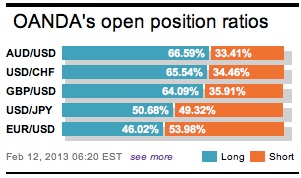Now that Currency Wars have been headline fodder for a couple of weeks, it has been necessary for authorities to step in and cool that thought. This market has been assured from the highest authority, credible or not, that the ECB sees no risk of a currency war and it must be avoided. Vice-president Constancio reiterated the ECB’s position, stating that they respect the “the G7 and G20-nation principles of floating exchanges” and the EUR being a member, its value should be left to the markets. The authorities only concerns rely in the single currency’s exchange rate effect on future inflation.
What about Japan’s monetary easing efforts? The ECB is relying on the good nature of nations that have signed the G7 and G20 statements not to pursue “unilateral interventions” in the currency markets. Japan knows that any “direct intervention in the foreign exchange market must be coordinated with other major floating currencies.

Japan received a slapping on the wrists from Europe and the US when it last intervened directly without warning. Finance Minister Aso is in no position again to test the patience of the floating free world. Both EUR and USD/JPY are reaching higher as the G7 understands that Japan is not targeting the exchanging rate, its just taking steps against deflation.
According to the G7, Japan can do what it likes as long as it does not actually intervene or buy foreign bonds. Today’s G7 statement is a tantamount to closing of their ranks ahead of the G20 meeting later this week. It would be foolish of the largest economies to see Japan fail. Economically, they require a solvent viable Japan, and political they require an ally to thwart any of China’s unwanted influences in the region.
Now we get to see how much “real” influence the G7 holds. How will they react? The other emerging economies in the G20, like South Korea who are currently losing competitive advantage to a tumbling Yen. The emerging economies influence is mighty, but how mighty?
In Brussels today, Europe’s finance ministers are expected to debate the latest developments in the Euro crisis, including the EUR’s recent rise that is currently threatening the region’s promising economic recovery. The French Finance Minister is trying to table a G20 debate on volatility in global exchange rates for his “boss” President Hollande.

The French President is having a tough go of it domestically. Even his foreign policies are being highly scrutinized. So, breaking ranks and challenging the EUR value itself is perhaps an easy political win or so it seems. His problem is that all 17-finance ministers have to agree with him. Historically, that is not an easy European task.
After S&P and Fitch, Moody’s has weighed in and cut their growth outlook for some of the world’s largest economies. This morning they have lowered their expectations for real GDP for the eight most advanced economies in the G20 by –0.2% from their last November’s forecast to +1.4% for 2013. It’s no wonder that investors are looking towards the east, to economies that are experiencing structural change, away from cyclical maturing economies like that of Europe and North America to the lands of emerging markets.
UK CPI this morning (+2.7%) is again line with expectations. The BoE last week indicated that the “sticky” inflation rate is expected t remain above the desired level of +2% for two more years. Authorities are sticking to the old script that it is due to temporary factors. Currently, the “Old Lady” has downgraded its focus on inflation and turned its attention towards growth risks. Tomorrow, the BoE releases this month’s inflation report.

EUR crosses are dictating the action. This morning’s G7 statement is supporting this one-cent EUR break higher. The single currency’s trend remains in place. How about a 1.40 overshoot? Japanese policy, the one the G7, the ECB and Fed have bought into thus far, will create more liquidity. Domestic investors, by nature, will probably prefer to seek higher returns further afield. This will benefit the EUR and drag it much higher.

Other Links:
EUR/USD – Euro Stems Sharp Losses
This article is for general information purposes only. It is not investment advice or a solution to buy or sell securities. Opinions are the authors; not necessarily that of OANDA Corporation or any of its affiliates, subsidiaries, officers or directors. Leveraged trading is high risk and not suitable for all. You could lose all of your deposited funds.


